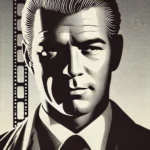Discover the Life and Career of Lee Marvin
Lee Marvin stands as one of Hollywood’s enduring legends, celebrated for his rugged charm and the unique ability to embody morally complex characters. From his menacing early roles to his unforgettable performances as a leading man, Marvin carved out a one-of-a-kind space in American cinema. His presence on screen was magnetic, his talent undeniable.
Early Life and Career
Born on February 19, 1924, in New York City, Lee Marvin came from a family with a strong military tradition. This upbringing, combined with his service as a Marine during World War II, had a profound influence on his life and the roles he chose to play. After the war, Marvin found his way to acting, beginning with small roles in theater before transitioning to television and film.
His early career often saw him typecast as a villain, largely due to his imposing physicality and intense gaze. Films like The Big Heat (1953) and Bad Day at Black Rock (1955) showcased his ability to bring depth to even the most sinister characters, proving he was more than just a tough guy.
Breakthrough and Stardom
Marvin’s career reached new heights with Cat Ballou (1965), where he portrayed both the bumbling, drunken gunslinger Kid Shelleen and the villainous Tim Strawn. This dual role earned him an Academy Award for Best Actor, solidifying his place as one of Hollywood’s leading men. The film was a perfect showcase for Marvin’s ability to blend humor with gravitas.
He followed this success with iconic roles in The Professionals (1966), The Dirty Dozen (1967), and Point Blank (1967). These performances explored themes of redemption, duty, and the morally ambiguous nature of violence. Marvin’s screen presence and his ability to connect with audiences made these films enduring classics.
Key Films of Lee Marvin
- Cat Ballou (1965): His Oscar-winning performance that redefined his career.
- The Dirty Dozen (1967): A gritty war film that remains a favorite among fans.
- Point Blank (1967): A crime thriller where Marvin delivered a masterclass in minimalist acting.
- The Big Heat (1953): A role that cemented his reputation as a compelling antagonist.
Signature Style
What truly set Lee Marvin apart was his authenticity. He brought a raw, lived-in quality to his roles that few actors of his era could match. His gruff voice, weathered features, and understated delivery made him a natural fit for Westerns, war dramas, and noir thrillers. Marvin’s performances never felt rehearsed; they felt real.
His collaborations with directors like John Boorman (Point Blank) and Richard Brooks (The Professionals) showed his ability to elevate genre films into something deeper. In Point Blank, his restrained yet emotionally charged performance remains a benchmark for actors seeking to convey depth without excess.
Later Years and Legacy
During the 1970s and early 1980s, Marvin continued to take on challenging roles, delivering memorable performances in films like Emperor of the North (1973) and The Big Red One (1980). Though his on-screen appearances became less frequent, his influence on Hollywood persisted.
Off-screen, Marvin was known for his sharp wit and no-nonsense personality. His contributions to cinema influenced a generation of actors, including Clint Eastwood and Tommy Lee Jones, who adopted his blend of stoicism and complexity.
Why Lee Marvin Matters
Lee Marvin’s impact on cinema goes beyond his remarkable performances. He redefined what it meant to be a Hollywood tough guy, bringing depth, vulnerability, and a sense of realism to his roles. His films continue to captivate audiences, serving as a testament to his immense talent.
Whether you’re revisiting his classics or discovering his work for the first time, Lee Marvin’s filmography offers a rich tapestry of stories that reflect the essence of a true Hollywood legend. His legacy lives on, both on screen and in the actors who follow in his footsteps.
